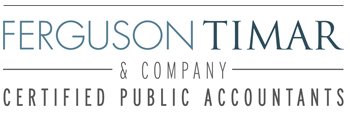
Tax Day will be here before you know it. The time has come to make final preparations for filing or extending by April 15, and for making a payment to the IRS. This is a busy time of year for the tax preparers at Ferguson Timar. These are three of the topics on our minds right now:
- Pull together financial information about 2019.
For many people, pulling together the required information is the hardest part of filing taxes. Finding the prior year’s return and gathering tax reports from banks, investment advisors, and others can be time-consuming on their own. But for many taxpayers, accounting for potential deductions is the most complicated part of tax preparation. If filing by April 15 is important to you, get this process started early.
Ideally, calculating deductions is a matter of tabulating receipts for things like unreimbursed work expenses, charitable contributions, and so on. For taxpayers who aren’t particularly organized, finding receipts can be a big job. Getting them into the right tax category is the next step.
Taxpayers who went through major tax events in 2019 will want to take extra time to ensure they have all the necessary information they’ll need to complete accurate returns. The purchase or sale of a home or business, getting married or divorced, having significant health costs, and other big changes can have significant tax consequences.
- Maximize contributions to your retirement accounts.
Many taxpayers set up automatic deductions from payroll or a checking account to ensure their retirement accounts are funded by year-end. It’s important to verify that the maximum contribution was in fact made. If it wasn’t, now is the time to top off.
Taxpayers who own Traditional or Roth Investment Retirement Accounts (or IRAs) have until April 15 to maximize their contributions for the 2019 tax year. For 2019 and 2020, individuals can contribute up to an aggregate of $6,000 to either a Traditional or Roth IRA, or a mix of the two. The limit goes up to $7,000 for people who are 50 or older.
Individuals with 401(k) plans typically need to make their contributions prior to the end of the calendar year, but in some cases may be able to make contributions that will apply to the 2019 tax year even after January 1. For example, self-employed individuals who file their business taxes on April 15 may have the option of contributing to their solo 401(k) plan on or before April 15 if certain conditions are met. Check with your plan administrator or get in touch with the tax advisors at Ferguson Timar to evaluate whether a contribution made before April 15 can be applied to 2019.
- File for an extension if you need one, but remember to pay estimated taxes on time.
If completing your returns by April 15 is going to be difficult, consider filing for an extension of time. Extensions are granted automatically to taxpayers who submit a timely request. The request can be made online. Once extended, the taxpayer has until October 15 to submit a completed return for the 2019 tax year.
Bear in mind that an extension of time applies only to the submittal of the return, not to the payment of taxes. A taxpayer who receives an extension still must make a payment to the IRS by April 15. IRS Form 1040-ES provides a worksheet for calculating estimated taxes. For many taxpayers it’s best to work with a preparer to ensure the estimated tax payment is accurate.
Call Ferguson Timar for your tax preparation needs.
The tax advisors at Ferguson Timar work year-round to ensure their clients are ready to file their tax returns accurately and on time. Do you need help getting your 2019 returns in order? Give us a call at (714) 204-0100 or reach out through our contact page to talk to one of our advisors today.
